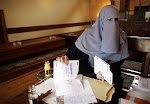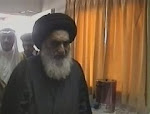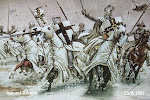Although Prophet Muhammad says women are evil, are disallowed to travel alone, and compares them to dogs and donkeys, many Muslims still believe that Muslim women are freer than their counterparts in the West.
We all should be proud of Islam. It has liberated women fourteen centuries ago! Prophet Muhammad brought such a tolerant, merciful and liberating religion. Therefore, never forget to repeat ad nausea “Peace be upon Him” every time you mention the Prophet’s name. Here is the proof.
Women who pass by a praying man annul his prayer
Narrated 'Aisha: The things which annul prayer were mentioned before me (and those were): a dog, a donkey and a Woman. I said, "You have compared us (women) to donkeys and dogs. By Allah! I saw the Prophet praying while I used to lie in (my) bed between him and the Qibla. Whenever I was in need of something, I disliked to sit and trouble the Prophet. So, I would slip away by the side of his feet." (Book #9, Hadith #493)
A Jew also annuls the prayers of a man
Narrated Abdullah ibn Abbas: Ikrimah reported on the authority of Ibn Abbas, saying: I think the Apostle of Allah (peace_be_upon_him) said: When one of you prays without a sutrah, a dog, an ass, a pig, a Jew, a Magian, and a woman cut off his prayer, but it will suffice if they pass in front of him at a distance of over a stone's throw. (Book #2, Hadith #0704)
Women are not allowed to travel alone
(38) Narrated Ibn 'Umar: The Prophet said, "A Woman should not travel for more than three days except with a Dhi-Mahram (i.e. a male with whom she cannot marry at all, e.g. her brother, father, grandfather, etc.) or her own husband.)" (Book #20, Hadith #192)
(40) Narrated Abu Huraira: The Prophet (p.b.u.h) said, "It is not permissible for a Woman who believes in Allah and the Last Day to travel for one day and night except with a Mahram." (Book #20, Hadith #194)
Non-Muslims are also subjugated to the “law” of Shari’a
(54) Narrated 'Abdullah bin 'Umar: The Jews brought to the Prophet a man and a Woman from amongst them who have committed (adultery) illegal sexual intercourse. He ordered both of them to be stoned (to death), near the place of offering the funeral prayers beside the mosque." (Book #23, Hadith #413)
A woman is allowed to fast only with permission from her husband
The Messenger of Allah (may peace be upon him) said: No woman should observe fast when her spouse is present (in the house) but with his permission. And she should not admit any (mahram) in his house, while he (her husband) is present, but with his permission. And whatever she spends from his earnings without his sanction, for him is half the reward. (Book #005, Hadith #2238)
See how much freedom women have in the islamic world? They have none.
Read it all:
http://www.islam-watch.org/Sami/Women-in-Words-of-Prophet-Muhammad.htm
12 years ago






















2 comments:
Asalamu aleykum
The majority of scholars say that a woman should not travel away from home unless a mahram is with her.
However, there were situations, even at the time of Prophet Muhammad (s.a.w.) when women did travel without a mahram.
Woman Traveling Without a Chaperone
by Sheikh Sâmî al-Mâjid
Professor at al-Imam University, Riyadh.
The Islamic legal rulings that pertain to the daily affairs of life are always connected to the welfare of the people in their individual lives and in their relationships with each other. Such rulings, therefore, have causes that can be grasped by reason and understood in a clear and precise manner.
These rulings differ from those that pertain to acts of worship, since acts of worship are connected to the benefits of the Hereafter and our direct relationship with Allah. Such matters are generally not discernible to the human intellect. Many great scholars have tried to determine the wisdom behind why we do certain things in prayer and in pilgrimage - and quite often they have failed and said: "This is purely a matter that we must accept on faith. Allah knows best about it."
The ruling that a woman may not travel without her husband or a male escort from her immediate family (a mahram) falls under the first category of rulings. We can appreciate the reason for the prohibition. When we understand that the reason for this prohibition is the fear for her sanctity and honor and the fear that she might be taken advantage of or raped, then we know that the issue is one that needs to be weighed in light of the benefits and harm present in a given situation.
Therefore, we have the opinion in Islamic Law that it is permissible for a woman to travel without a mahram when she is reasonably assured of her safety or when traveling poses no more danger for her than staying at home. The latter situation is often the case in non-Muslim countries where walking down her own street can be more dangerous for her and full of temptation that sitting on board an airplane. The environment of an airplane is quite often safer and more wholesome than that of the neighborhood in which she lives.
From this point of departure, we shall present the evidence and juristic reasoning of the pe! ople of knowledge:
`Adî b. Hâtim relates that Allah's Messenger (peace be upon him) said to him: "O `Adî, have you seen al-Hîrah (a region in Iraq)."
`Adî replied: "I have not seen it, but I have heard of it."
Allah's Messenger (peace be upon him) said: "If you live long enough, you will see a woman departing by camel in a litter and traveling until she reaches the Ka`bah without fearing anyone but Allah."
`Adî informs us that he thought to himself: "Where are the robbers and bandits who run rampant through the land?" Then `Adî says: "I have seen a woman travel by camel litter from al-Hirâh to the Ka`bah fearing no one but Allah." [Sahîh al-Bukhârî]
This hadîth shows us that it is permissible for a woman to travel unescorted if the road is safe. Someone might argue that the statement of the Prophet (peace be upon him) is merely reporting that such a thing would one day take place, not that it is permissible. However, this argument is weak. This statement is made in a context of praising Islam and showing its future ascendancy. Therefore, it must be assumed that what is being used to indicate such praise is permissible in and of itself. Moreover, `Adî b. Hâtim saw this woman and did not condemn her action, nor did anyone else.
Al-Bâjî, in al-Muntaqâ, writes: "Perhaps what some of our scholars have said (regarding prohibition) refers only to cases where the woman is alone or with a small group. As for the great caravans and the secure major thoroughfares, they are to me no different than the places of residence that are filled with markets and merchants. In such cases, her safety is secured without the presence of a mahram or female companions. This opinion has been related to us from al-Awzâ`î."
Qâdî `Iyâd, when discussing the prohibition of a woman traveling without a mahram to escort her, says: "This refers only for a young woman. As for an older woman who is less enticing, she can travel anywhere she wants with out her husband or a mahram. Ibn Daqîq al-`! Id: considers this a specification of a general ruling in consideration of the meaning behind it."
The great jurists Mâlik and al`Awzâ'î - and also al-Shâfi`î in his more prevalent opinion - rule that a mahram escort is not a condition for a woman to make her obligatory pilgrimage. The only condition is that she will be safe on the journey. Al-Shâfî'î says: "Safety can be achieved by her being chaperoned by her husband or her mahram, or by the company of other trustworthy women."
Some scholars have said that if it is safe enough, she needs no one to accompany her. She can travel alone along with the caravans and be safe. This is indicated by the hadîth of `Adî that we mentioned earlier.
Permissibility is even more certain when a woman cannot find a mahram and her best interests are to be secured by her traveling. Permissibility is indisputable in cases where travel becomes a necessity for her, on account of the principle in Islamic Law that necessity makes unlawful things permissible. This is why the scholars have permitted a woman to travel unescorted to emigrate from a non-Muslim country to a Muslim one. In some situations, they even declare such a journey to be obligatory upon her.
And Allah knows best. And may the peace and blessings be upon our Prophet Muhammad
Taken from : http://community.livejournal.com/muslims/616971.html
Muhammad (pbuh) the Feminist
I wonder how many men and women nowadays can digest the idea of calling Prophet Muhammad (peace and blessings be upon him) a "feminist".
That is, a feminist in the sense of one who always stood for the rights of women. In fact, he was just that, though the term applied to the Prophet (pbuh) could sound a bit quaint or anachronistic.
In a cultural milieu where baby girls were buried alive and wives were treated no better than chattel, the Prophet (pbuh) courageously liberated them and raised their status to equal that of men.
Muslims see Muhammad (pbuh) as living up to his God-appointed mission as the final messenger of God, standing up like a titan towering above the barbaric influences of the time to become the spiritual leader of the whole Muslim nation in Arabia as well as everywhere else Islam reached.
"The most valuable thing in the world is a virtuous woman."
- Prophet Muhammad (pbuh)
Literally, he rose to the high standards of leadership set by his own tradition: He was humble enough to listen to the complaints of his people and always hastened to meet their needs.
To the weakest among the people, he was compassionate, and considering the condition of women in those days, he was very responsive to their thoughts, feelings, and needs. He was particularly gentle, kind, and considerate toward them.
In this respect, he was very much unlike some of his Companions.
Umar ibn Al-Khattab once said:
One day I went to the Prophet and saw him smiling. "May God make you smile forever, O Messenger of God," I said and asked why he was smiling. "I smile at those women. They were chatting in front of me before you came. When they heard your voice, they all vanished," he answered, still smiling. On hearing this answer, I raised my voice and told them, "O enemies of your own selves, you are scared of me, but you are not scared of the Messenger of God, and you do not show respect to him." On hearing that, the women said, "You [Umar] are hard-hearted and strict." (Al-Bukhari )
Twin Halves of Men
The Prophet (pbuh) always listened to women with consideration and compassion as he valued their views and opinions not only about affairs that specifically concerned them, but also about matters of wider significance.
It was because the Prophet (pbuh) gave such encouragement to women that there were well-known instances in early Muslim history of some of them freely speaking out for their rights.
Following the injunctions in the Qur'an, the Prophet (pbuh) gave women the right to education and freedom in matters related to marriage, divorce, and property rights.
"Women are your mothers, daughters, aunts."
- Prophet Muhammad (pbuh)
The Prophet (pbuh) described women as "the twin halves of men," which emphasized the idea that their role in society is complementary to that of men. He declared that "the most valuable thing in the world is a virtuous woman."
He taught his followers that it is God's commandment to treat women with gentleness and affection because, he said, "they are your mothers, daughters, aunts."
Women Are Not the Devil
One typical Western criticism of the Prophet (pbuh) is about his marriages. Compared to the Christian conception of Jesus as the "Son of God", Muhammad (peace be upon him) appears so down-to-earth and human.
If Christianity celebrates celibacy, Islam definitely celebrates marriage. And the final prophet, like the Old Testament prophets such as Abraham, Moses, and David, has proved through his own example that women do not defile men.
Indeed, Islamic spirituality is not weakened by the body, as it transcends far above the demands of the body. Also Islam, unlike Christianity, does not view the woman as the cause of the fall of man.
Respecting Mothers
The respect given to women as mothers is another aspect of "the Prophetic vision, in which kindness and loyalty to the mother, a rahmah (= mercy) to reciprocate the rahmah they themselves dispensed, is seen as an almost sacramental act" (Murad).
The Prophet (pbuh) said, "Paradise lies beneath the feet of mothers" (Ahmad).
"He always joined in household work and would at times mend his clothes, repair his shoes, and sweep the floor."
- Lady Aishah
Once a man came to Prophet Muhammad (pbuh) and asked, "O Messenger of God, which person of all the people is best entitled to kind treatment and good companionship from me?" He answered, "Your mother." The man asked, "And then?" He said, "Your mother."
The man asked again, "And after her?" He said, "Your mother." The man asked for a fourth time, "And after her?" The Prophet said, "Your father" (Al-Bukhari).
The Perfect Husband
The Prophet (pbuh) was a perfect model for humankind in every aspect of our life. He was the kindest husband and the most loving and caring partner to his wives.
"The best among you is the one who is best toward his wife"
- Prophet Muhammad (pbuh)
According to Aishah, the Prophet (pbuh) used to help his wives with domestic chores: "He always joined in household work and would at times mend his clothes, repair his shoes, and sweep the floor. He would milk, tether, and feed his animals and do the household shopping."
He taught his followers: "The best among you is the one who is best toward his wife" (At-Tirmidhi).
We should remember that those were the days when women were treated like slaves and were punished for the silliest mistakes. The Prophet stopped all that and gave women the rights equal to those of men.
For instance, Islam gave a wife the right to acquire and possess wealth and keep it for herself, and she had no responsibility to share the family expenses with her husband. And the husband had no legal right to any of her belongings.
The Plight of Women
In ancient times when a man died, his widow was often denied all rights to his property and she was subjected to terrible humiliation and maltreatment.
Islam believes that the one who works for widows and orphans is like one who strives in the way of God.
In certain societies, there was a tradition of immolation of the widow on the funeral pyre of her husband. Even if she was permitted to live, she was denied the right to remarry and lead a normal life.
But the Prophet (pbuh) himself set the example of marrying widows and divorcees; his first wife was Khadijah, a widow 15 years senior to him. And after her death, he married only widows and divorcees with the exception of Aishah.
Islam believes that the one who works for widows and orphans is like one who strives in the way of God. And we must remember that in those primitive times, a woman who did not have the support of a man was lost and ruined.
The Prophet's mercy toward women was not surprising, because Almighty God had appointed him as a mercy for the whole of creation.
A Revolutionary Man
In the Madinah society after the emigration of Muslims from Makkah established by the Prophet, women were guaranteed personal respect, the right to education, the right to enter into legal contracts, and the political right to express their views concerning public affairs.
They were also given the right to choose a husband of their liking and to reject a marriage they did not like. At the time of marriage, a woman is entitled to a suitable present (in Arabic: mahr) from her bridegroom, and she is declared free of all domestic financial responsibilities, which are the responsibility of the husband.
The husband is not to keep his wife in a state of suspense, whether at home or abroad, for a long period of time except with her consent.
It is the duty of the husband to provide his wife and children with food, clothes, a home, and medical treatment according to his financial position and income. Muslim scholars have said that if a man does not support his wife financially, then she is entitled to get a divorce.
The Prophet (pbuh) said that the best charity (in Arabic: sadaqah) is that spent on one's wife: forgiveness in the case of disagreement, good manners, sweet words, a smiling face, a pleasing playfulness, and an amusing mien are but some facets of this "charity."
The Prophet (pbuh) said, "The world is delightful, and its greatest treasure is a good woman" (Muslim).
The husband is not to stay away from his wife or keep his wife in a state of suspense, whether at home or abroad, for a long period of time except with her consent. Unreasonably long separation on the part of the husband without prior arrangement with the wife is sufficient grounds for her to obtain divorce through a judge.
Indeed, the Prophet (pbuh) allowed women to engage in suitable work for earning an income like men, so long as such jobs did not infringe on their dignity. He permitted them even to participate in battles: specifically to nurse the wounded soldiers and to fight alongside men.
All this was indeed revolutionary, considering the prevailing socio-cultural paradigms defining the Arabs of the time. So it was not surprising that so soon after the Prophet's time, the vestiges of the pre-Islamic era, traditions from pre-Islamic Arabia slowly returned and gained somewhat of a foothold among Muslims.
Consequently something of the misogyny that previously existed returned, which reminds us of the need for reaffirming the noble example of the Prophet, whose compassion to his wives, daughters, and women companions cannot be forgotten.
References
Anjum, Darakhshan. "Apostle of Peace and Mercy for Women." Radianceviews Weekly. 15 April 2007. Accessed 5 Nov. 2007.
Murad, Abdal Hakim. "Boys Will Be Boys: Gender Identity Issues." Accessed 5 Nov. 2007.
Murad, Abdal Hakim. "Islam, Irigaray, and the Retrieval of Gender." Masud.April 1999. Accessed 5 Nov. 2007.
Pickthall, Marmaduke. "Social Degradation of Women a Crime and a Libel on Islam: The Un-Islamic Indian-Style Purdah System." Accessed 5 Nov. 2007.
Syed, Ibrahim B. "Women in Islam: Hijab." Islamic Research Foundation International. Accessed 5 Nov. 2007.
Post a Comment